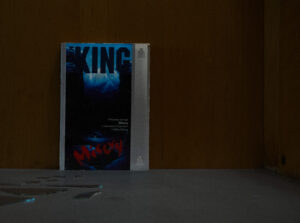As the Maine Campus settles into hibernation for finals week and winter break, I wanted to review my favorite short story, “The Death of a Government Clerk” by Anton Chekhov. The eerie, sardonic Russian spirit in this story, while not canonically set in winter, feels like a perfect icy lead into the frigidity of the incoming Maine frost.
I am a sucker for satire, camp and absurdity of all shapes and sizes in literature and movies. I will state my bias for “Death of a Clerk” outright– I am completely unable to say anything negative about this story, though I will admit it is not for everyone. It is an over exaggerated, overdramatic, completely twisted story about the value of politeness in high society. The arc and flow of the story itself is absurd; it begins with conflict in the first paragraph.
“Pardon, your Excellency, I spattered you accidentally…”
The main character, Tchervyakov, attends a function in which he sneezes without covering his mouth; consequentially spraying the gentleman next to him, Brizzhalov. The story then follows Tchervyakov’s desperate attempts to apologize and make up for his social fault to the man, an esteemed general. The general implores the protagonist to just forget about the incident, but Tchervyakov becomes obsessively eager to correct the wrong.
“Oh, that’s enough . . . I’d forgotten it, and you keep on about it!” said the general, moving his lower lip impatiently.
“He has forgotten, but there is a fiendish light in his eye,” thought Tchervyakov, looking suspiciously at the general.
Tchervyakov apologizes again later and when there is still no catharsis, he goes to his wife in dismay. His wife is similar to the reader until this point, confused as to why a sneeze warrants such drama. Another day goes by. Tchervyakov remains completely disheveled and distraught, going to Brizzhalov’s work meeting to beg for forgiveness. He then writes his “victim” a letter, but ultimately decides to try apologizing in person again, to which Bryzgalov becomes so annoyed he removes him from his offices.
The descent into madness for Tchervyakov proves too hard to bear. Completely convinced that his sneeze has hurt Brizzahalov and that his reputation is now tainted, the protagonist goes humiliated in his home.
“Something seemed to give way in Tchervyakov’s stomach. Seeing nothing and hearing nothing he reeled to the door, went out into the street, and went staggering along. . . . Reaching home mechanically, without taking off his uniform, he lay down on the sofa and died.”
The dramatic irony of Chekhov’s writing is written simply. The themes of obsession, social law and death are eerie when in the backdrop of comical, fast paced lines. The story toys with the reader’s expectations, the light hearted manner of it playing tug-of-war with the premise. The trivial absurdity of a sneeze is life or death. Any passivity in tone is the vocal fry of an executioner. Social contract is everything.
This short story is far from modern day. Especially far from modern-day America. An all-too common issue with classic works is the difficulty to relate to the manner in which it is written or to empathize with outdated cultural conventions. This story, while classic, is no harder to decipher or get through than any modern work. Google the short story, take 15 minutes to read it and get a good laugh. Even if I spoiled the entire thing, it lives up.

















